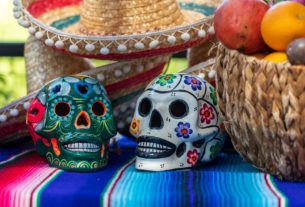At Home in Talpa de Allende, Jalisco
In matriarchal-governed communities we sometimes loose sight of the patriarchal side of the coin. We have read that physical and mental abuse runs amuck in Latin American homes. Pick up any newspaper in whatever part of the world you may be living in and you’ll find the statistics are about the same. These conditions do exist, but we prefer to think they are the exception to the rule.
I think I see more abandonment than I do abuse. Abandonment is a form of abuse, but in today’s economic battle, many of these men are forced to leave their families behind to seek work that pays enough money to support them.
Come visit with me in my neighborhood here in Talpa. My next-door neighbor has five kids, the oldest one is fifteen and the baby is six. Carlos is a sometimes brick-layer, the neighborhood drunk, a lazy, good-for-nothing, whose wife runs a clandestine store from the side terrace of their house.
She sells a little of everything just to help make ends meet. If you want a cold beer in the middle of the afternoon, go to Juana; she will have it. Run out of bottled water? She has it. She makes cheeses from the watered-down raw milk sold from the back of a pick-up truck delivering daily on our street. She also makes floral wreaths for the cemetery.
Carlos’s children and wife adore him. He knows he’s loved when his brood of five come running to meet him, and escort him home from his afternoon spent in the cantina. I have never seen a bruise on anybody in that family except Carlos, when he listed too far to the left one night and fell off his horse.
Justino is a jack-of-all-trades. He knows a bit about electrical wiring, plumbing, and floor installation. He and Rosa have three children who are immaculately groomed and dressed every day.
Tino doesn’t have steady work, so he goes from village to village; picking up a job here and there.
Often he takes on a job that requires him to be away from home several days at a time. When he does return, his house is filled with a merry cacophony. His oldest kid is sent hurrying to the market to buy a chicken for the pot. There’s money in the house today.
I’ve heard that hormones tend to bounce higher in the tropics. Several years ago, they vaulted for one my young friends, and he became a father at the age of fifteen. Not he, the girl, nor their parents had any intention of the pair getting married. As it turned out, the best friend of the biological father stepped up to base and offered to marry the mother, and rear the child as his own. Natasha now has a baby half-sister in Chicago, and other half-siblings on the Pacific Coast in Mexico. One of her grandmothers told me recently, “I don’t know which daddy will walk down the aisle with her when she marries. They both love her dearly.”
Lupe and Berta only have one little girl. Lupe is a school teacher, but his school is a three-hour bicycle ride from their home. He lives all week in the village and peddles home on Friday afternoons. He doesn’t have much time to spend with his family, and neither do many other Mexican fathers.
However, all these fathers seem to have one thing in common. It is an un-written rule that Sunday is set aside as family day. Look at your big city parks. Families are strolling together or seated together on the grass under a shady tree. You will see fathers treating the family to an ice cream in a small town plaza. You may see some fathers on the soccer field, but their kids will be on the side cheering them on.
Every Sunday in Mexico is Father’s Day.


